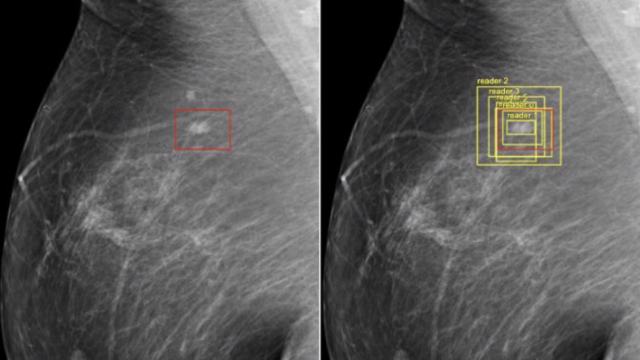Google, in its bid to move into healthcare, reports that researchers have successfully trained AI to detect breast cancer with greater accuracy than doctors. In a Google-funded study, a team of independent researchers from various hospitals and universities, researchers from Google Health, and engineers from DeepMind (a Google-owned UK-based AI company) compared analyses of nearly 29,000 mammograms from UK and U.S.-sourced datasets. The study reports that they found 9.7% and 2.7% reductions in false negatives in the U.S. and UK, respectively, and false positives reduced by 5.7% and 1.2%, respectively. This was despite the fact that the AI had less information to work with. In its control study, Google gave six radiologists 500 randomly-selected mammograms from its U.S. dataset, along with access to patients’ age, breast cancer history, and previous mammograms.
Google provides limited information on the demographics of its survey sample, but if the AI works for a diverse population representative of the real world, AI can help to detect hard-to-spot cancer hidden behind dense tissue. The paper also indicates that it could “reduce the workload” for radiologists in the UK, where, unlike in the U.S., patients customarily get second opinions on each mammogram.
There’s undoubtedly more to come this decade, as Google expands into healthcare tech. CEO Sundar Pichai has called healthcare one of the biggest areas of AI “where the benefits will playout for the next 10 to 20 years.” The latest cancer study builds on Google’s previous effort to detect the spread of breast cancer through deep learning. Over the past few years, Google’s been training AI to detect diabetic eye disease and heart disease, as well as analysing data on the progression of multiple sclerosis. It attempted a product in 2014, a microchip-embedded smart contact lens that would detect blood sugar levels, although work on the lens was halted when tears weren’t found to be sufficient to measure blood glucose. In that context, its Fitbit acquisition–including Fitbit’s subsidiary Fitbit Health Solutions, aimed to wed health insurance costs with Fitbit data–makes a lot of sense.
Being Google, the company will gladly scoop your data as a shady means to benevolent ends. In 2017, UK authorities accused Google of using illegally-obtained health records for 1.6 million people for a DeepMind study on kidney injuries. Just a few months ago, the Wall Street Journal reported that the company allegedly amassed healthcare data on millions of Americans without their knowledge in a typically top-secret sounding mission called “Project Nightingale.” (Google noted that its data collection was HIPPA-compliant.)
In an outside response to the study, Etta Pisano, a professor in residence of radiology at the Beth Israel Lahey Medical Centre, urged the medical community not to get ahead of itself. Speaking with Gizmodo, Pisano pointed to the failure of early computer-aided detection, CAD, which was first introduced in the nineties and “showed great promise in experimental testing, but fell short in real-world settings”–it proved no greater diagnostic accuracy than human findings, and Pisano writes that “it has been speculated” that doctors were more likely to dismiss the results, given CAD’s tendency to over-mark images of shapes which weren’t actually cancerous. However, Pisano writes that breast cancer screening “is perhaps an ideal application for AI in medical imaging” with a substantial dataset to work from and a more binary determination than diagnoses which have to consider manifold factors.
Google doesn’t seem to make moral determinations with its powers, but here’s hoping that the company finds a better payoff in healthcare than drone imaging and state censorship.
